Interview with Claudia Herweg, President of the German Table Tennis Association
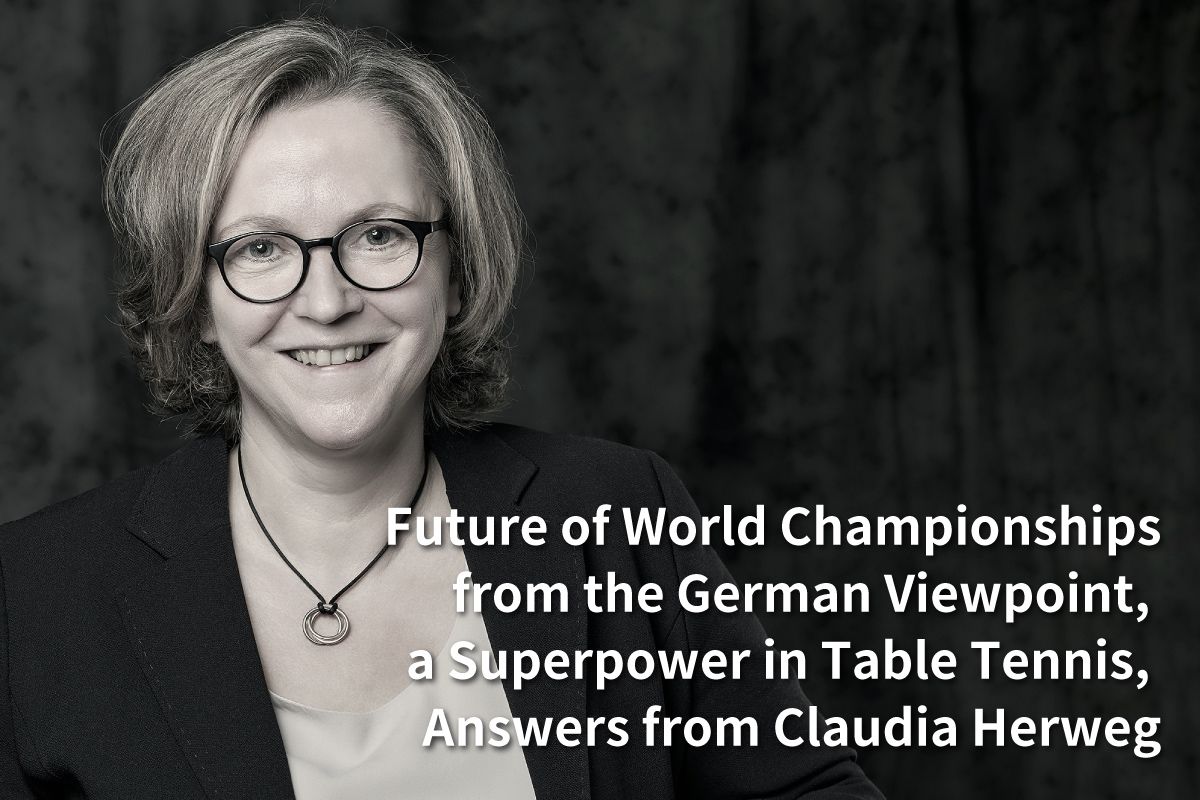
The performance of the German men’s team at the 2022 World Team Championships Finals in Chengdu, reaching the final, was a surprise for many table tennis fans.
Star players such as Timo Boll, Dimitrij Ovtcharov and Patrick Franziska, the “front persons” of German table tennis, withdrew from the Championships; the German team competed throughout the event with young players, including Dang Qiu, the recently crowned German national champion, Benedikt Duda and Kay Stumper. The team selection surprised the world greatly; there were many fans who lamented the absence of the “star players” from Germany.
In the interview Claudia Herweg, who became the first female President of the German Table Tennis Association last year, answered our questions with honesty, including the player selection for and the success at the event, as well as the attitude towards the future World Team Championships.
We are proud of the men’s result, the finalists.
— Congratulations on the achievements at the 2022 World Team Championships in Chengdu, a silver medal for men and bronze for women. Please share your thoughts on the success of the German team.
Claudia Herweg (hereinafter referred as CH) I am very happy with the results.
I expected the third place for the women’s team. We had a lot of options in the sense of playing style; we had Ying (Han Ying), a defender, Nana (Shan Xiaona), a short-pimple penhold player and Nina (Nina Mittelham), a topspin player, for example. I thought it would be very difficult to beat us, except for China, Japan and Hong Kong.
They competed against Japan at the semifinals and Ying was beaten by Mima Ito. She was too strong.
For the men’s team, I thought it would be difficult to achieve a medal as Dang (Dang Qiu) was in the 9th, Bene (Benedikt Duda) was 36th and Kay (Kay Stumper) was 103rd in the world ranking (as of the 39th week of 2022). I also had some worries in their work as a team as they are very young. We are very proud of the results overall.
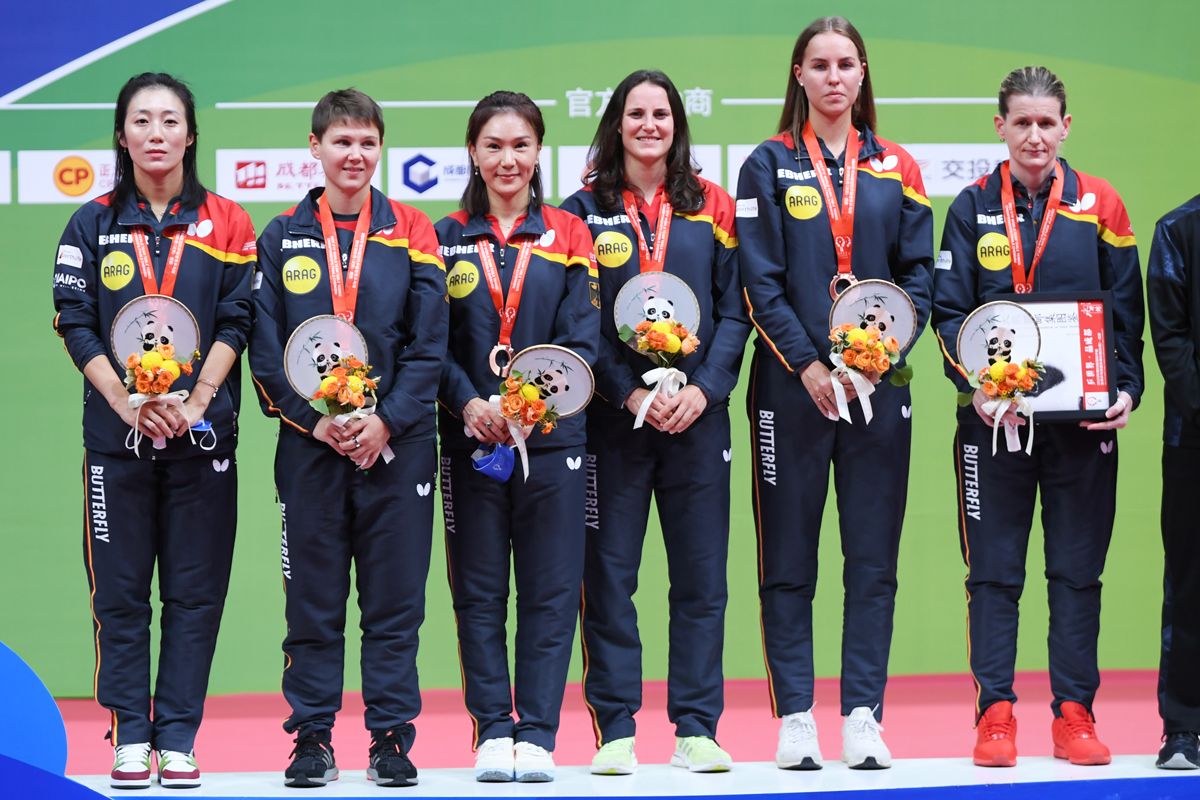
— What do you think was the reason of the good achievement of the men’s team this time?
CH I think the reason was a good mixture of knowledge, belief and will, in the end.
Our strength is the education system by coaches. We have a good system to guide players into the top 20 level in the world.
There are two big figures who contributed to the system, Rossi (Jörg Rosskopf, Head Coach of the German men’s team) and Hampl (Helmut Hampl, Coach of the German men’s team). Rossi is good at giving confidence to players, which is important to win close matches.
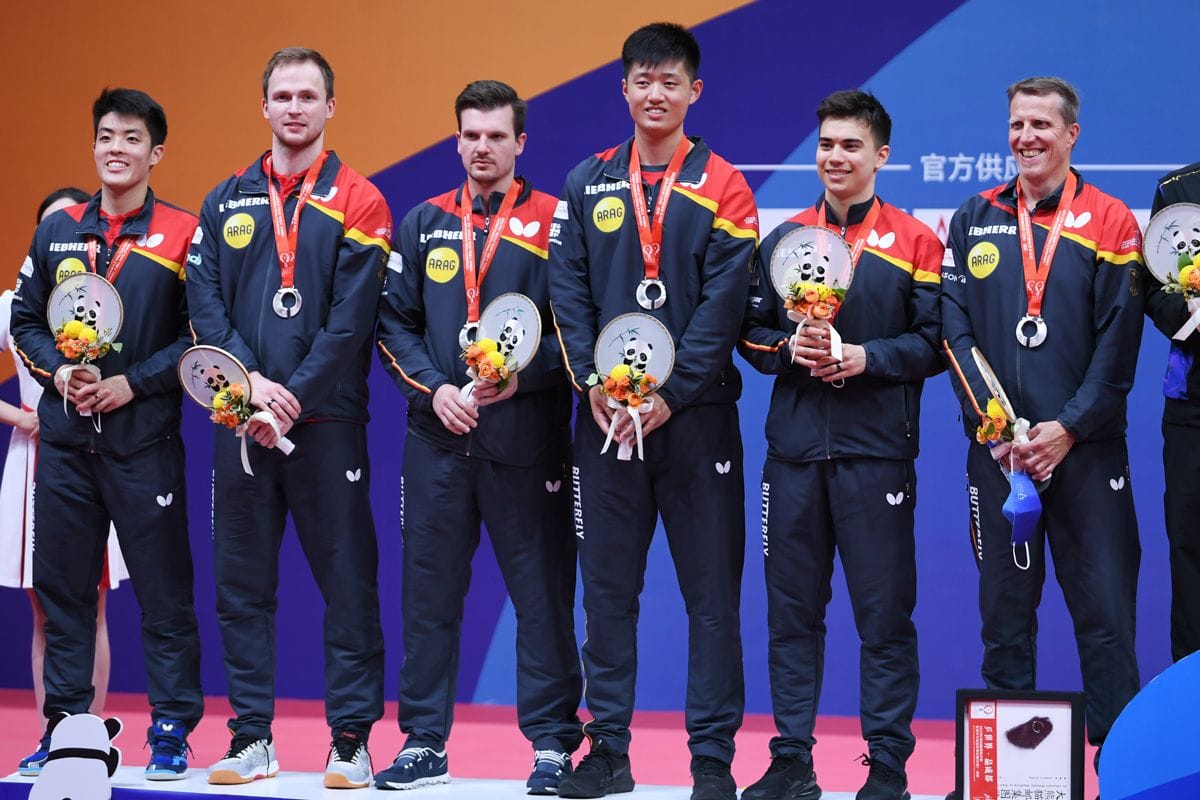
— What did you think about the performance of Dang Qiu and Benedikt Duda, who did especially well at the event.
CH For Dang’s case, the education by his parents (his father (Qiu Jainxin) and his mother (Chen Hong) were both table tennis players originally from China) influenced him a lot. He has a fundamental top-level education received since he was six years old; the advice from Rossi and Hampl was added, which made his performance stable and even better.
In particular, the establishment of his playing style for the last three to five years, thanks to the instruction of Hampl, is one of the big fruits. I did not expect he would be in the top 10 in the world when Hampl started coaching. The reason for his success seems to be the accumulation of experience added to the far-seeing policy of Hampl. I think he had a lot of pressure because he was no. 1 in the team in Chengdu, but he did a wonderful job.
For Bene, he is a typical German (lol) and has power, but he had not had many chances to play in the team at top events so far. I think he gained very good experience from the performance in Chengdu as the no. 2 in the team and finally displayed his ability to compete in the world. I felt his strong will for the event as he had not been able to capture the ticket to the world by losing in the internal qualifications.
Kay also made the best use of his chances; he is still young at the age of 20 and his strength is that he can play without any fear.
For your additional information, I have never seen a player like Dang, who takes care of every detail. He has surprisingly accurate information on the equipment he uses, He answers my questions with right information even when I ask him something in detail.
In the evening on the day before the finals of the European Championships this year, where he won the title, he asked me suddenly, “Claudia, may I glue a new rubber now?” when we were sitting together with coaches. I think that was the best timing for him. I felt his persistence and wish to make his equipment perfect whatever the circumstances.
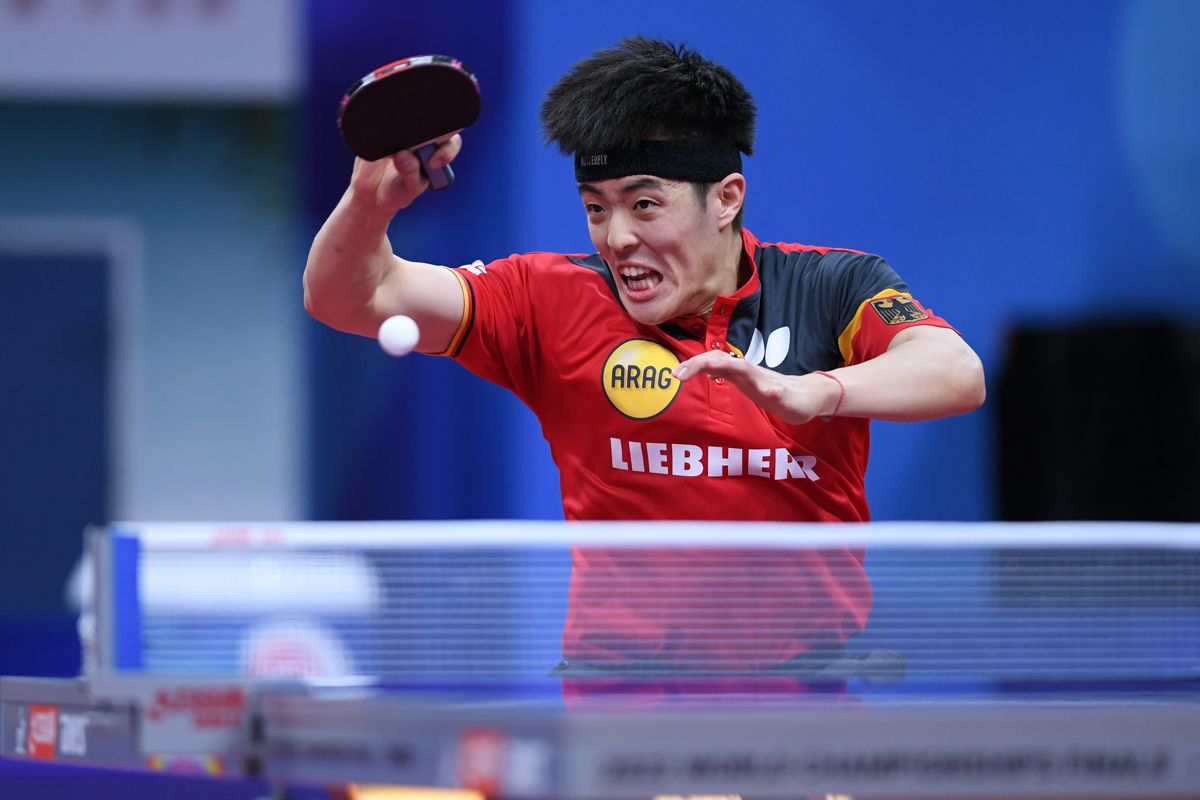
CH Yes, that is intentionally done, on purpose.
We are working on the development of players thinking that it is important to educate young talents around 5 years old in order to beat China.
The German top players so far all have their individual background that made them strong. Dang, as you know, has his parents who used to be Chinese table tennis players; for Dima (Dimitrij Ovtcharov) his father was a table tennis player; Timo, Rossi and Patrick were raised by Hampl; those players would not grow without their specific background.
On top of that, those able coaches will retire soon or later, the development and discovery of new coaches is difficult.
We will never form a team only with young players again.
— While we were glad to see the astonishing results of the German men’s team, we wished at the same time if we could have watched Timo, Dima and Patrick play. What would have happened if they had participated? We cannot help imagining the result might have been better with those three, but do you not think about such things?
CH There are three answers to that question.
Of course, first of all, I wanted them to play there. This is because they are top players and have good personalities. However, I understood their conditions and situations this time, so I finally answered, “Whatever is okay. It’s up to you,” when they expressed their non-attendance.
In addition, the wins and losses in the team event were not included in the singles world ranking, so we did not have to care that their rankings would fall even without attending the World Team Championships.
The second reason is that we wanted to give the opportunity to the younger players. There are five German players in the top 40 of the world and Dang, the no. 9 in the world, played as an ace. Without this kind of opportunity, he would have had no chance to play on position 1 in our team, because he is always the third or fourth player in Germany.
We thought that would be a good opportunity for him to feel pressures to play as the no. 1 in the German team. We had such an intention that we wanted him to have experiences to compete against strong opponents including China under such pressure. I am sure this meant a lot that we could give him such an experience before the retirement of Timo and other players. Dang would not be able to withstand the pressure if he occupied such a position after their retirement.
The third point to be noticed is the specific condition concerning pandemic. We knew the players would not have been able to come out from China for about four and a half weeks if they had participated in the World Team Championships and the subsequent two WTT events held in China. Timo is 42 years old and we respected his decision, judging that it would be difficult for him to compete in successive events in his best condition. For Dima, in addition to having his second child, his injury has not cured fully yet and he needed more practice. Patrick had no problem in the sense of play, but he had just had his first child which is a sensitive moment in his life; we accepted his non-attendance in consideration of the fully-scheduled event calendar for the next year.
It would be bad if the imposed attendance would affect their future performance for all the three. We thought it would be more important for them to display better performance in the future by securing enough time for family and themselves for the moment. Top players tend to be expected too much to do this and that, but they are humans, not machines, so we took a human-oriented decision this time.
— Based on the success of the German men’s team achieving silver this time, is there any possibility that you will focus in the team selection on having the young players experience at the future World Team Championships?
CH I don’t think we will do such a selection in the future.
I don’t think we should take this event as a model; it was the event held in China in the middle of pandemic. We would have sent Timo, Dima and Patrick if the event had been held under the normal conditions. Therefore, we would like to select the best five German players for the next event.
I think there is no national team member in Japan who is over thirty years old now, but in Germany, Timo is 42 years old and Dima is 34; I think we will have to manage their condition, including injuries and physical conditions, in order for them to continue to compete actively.
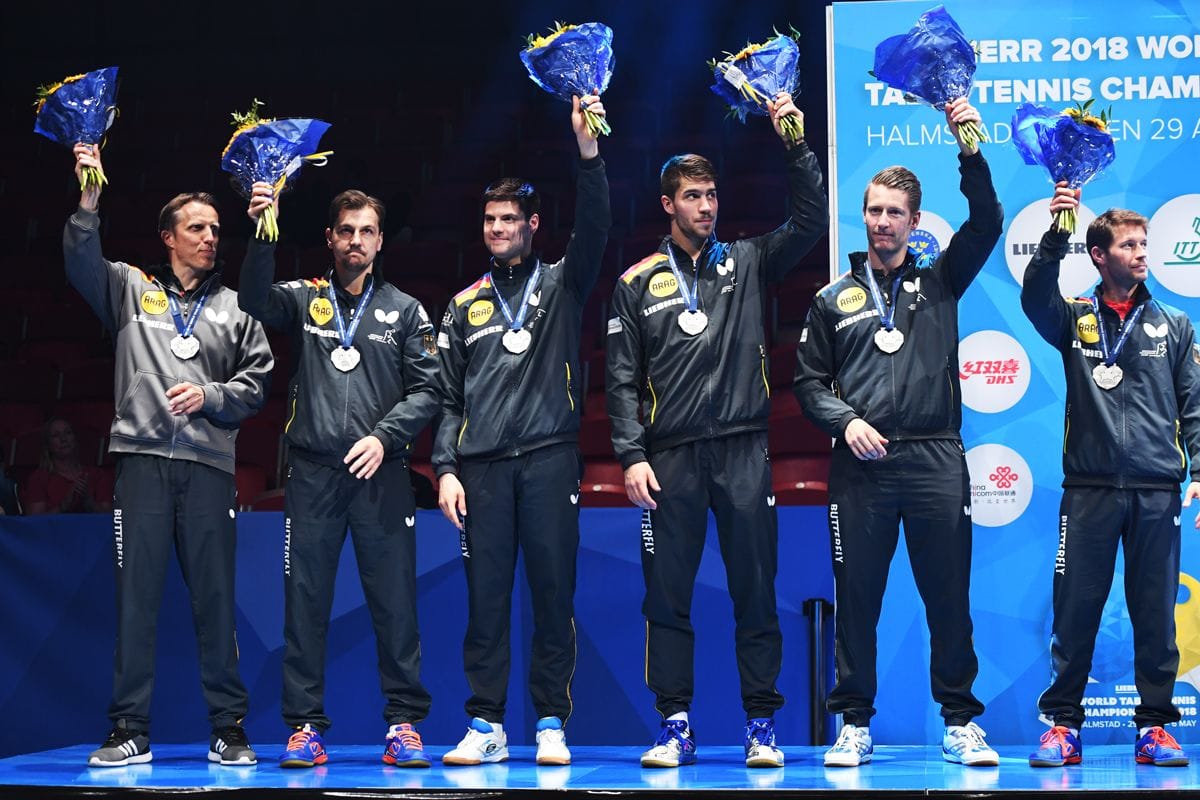
CH We will not accept such a thought because we still think the World Team Championships is an important event even though no singles’ ranking point are awarded.
We are not playing table tennis as a hobby; it’s our national team and the players are professional, so they want to be a part of this team.
We also had an intense discussion for about two hours regarding this point. Of course, we have sponsors for the team and the players, so I originally thought there would be no such option that Timo, Dima or Patrick would not attend.
However, we ended up respecting the decisions of the players this time because of their individual specific conditions in addition to the requirement from the organisers. There were big risks for us and many criticisms towards us to organise a team with mainly young players like this time. However, sometimes you have to take risks and face the fire if it fails.
Therefore, we plan to send the best players as German representatives in the future. However, I would say I cannot promise Timo will play at the next World Team Championships, because he is not a youngster, but a superstar.
We could not help making such a decision this time, but I think the German team is fortunate. There are always four or five strong players in the team and the national team players can compete with each other among those strong players every day. I guess the situation is the same in Japan and China.
However, on the other hand, as you can understand when you look at some countries such as Portugal, France and Romania, there are strong players but not many. I see the situation in those countries is totally different to that of Germany. France now has the Lebrun brothers, they went straight into the national team at such young ages; we can see their difficult situation with few good players.
We would like to increase the opportunity to make table tennis become more visible.
— We would like to change topics to the table tennis situation in Germany. I think the German Bundesliga has already been widespread in the life of German people as a culture. What made the situation?
CH In Germany there is a strong league system; the club system includes all the levels from youth to the seniors. The fans and players of the team usually used to go to watch the home matches in the first division as well as the matches held in the neighbouring cities.
However, this is the story in the past. There are many players who do not want to play 11 matches in a season. I used to play 22 league matches and other matches in one year; I played almost every weekend. However, there are many players who do not like many matches and a fixed schedule with less flexibility.
The system in the Bundesliga has been established, but, in fact, the table tennis market in Europe, including Germany, has been shrinking year by year. The number of players is decreasing; the situation has been so for the last one or two decades. On the other hand, I hear the markets in Japan and China have been growing. We have to take measures on the shrinking of the market in Europe.
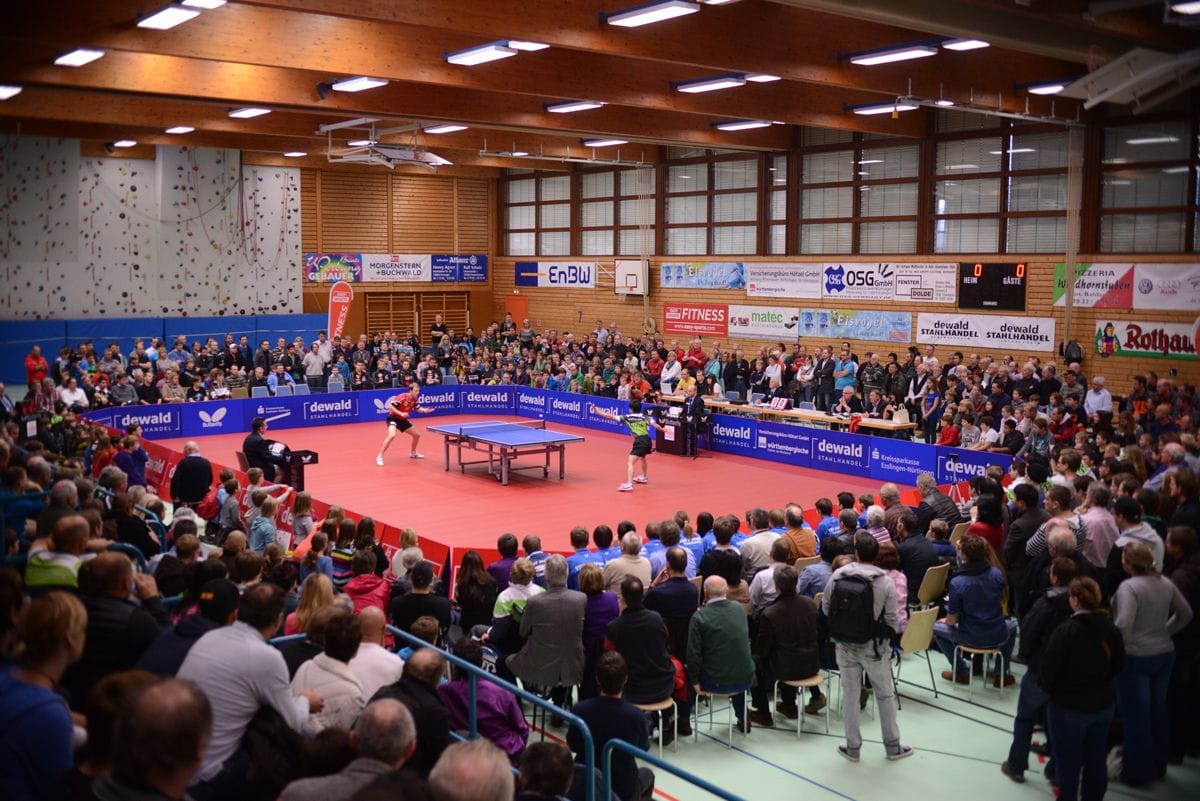
— What do you think is necessary to expand the table tennis market in Europe and to make the sport popular?
I think we need to compete with other sports. For basketball they have three versus three and for volleyball they have beach volleyball, for example, and they have generated new types and categories of those popular sports. Our field is shrinking due to the development of those new sports. We think this is the result of our lack of action so far, so we hope to increase the opportunities to hold top-class events in Europe. This does not mean we will organise events once in ten years in Germany, but we hope to hold big events such as WTT Grand Smash and WTT Champions every year.
I would like to increase the opportunities to make table tennis visible to more people than in the past. There was a good example; there was the European Championships in Munich with nine sport events and there was a report that the people who had not been familiar with table tennis came visit the table tennis event. It is important to make more sports fans involved in table tennis, not only table tennis fans.
I have no single answer to your question what is necessary to make table tennis more popular, but I think it is a very good topic to discuss in a group. We are working on a 10-year vision in Germany. What should be done to make not only table tennis fans but also sport fans, especially young people, come to the venues and watch table tennis? One part for me is to present new offers to play table tennis, outdoor or in the office, and new event platforms.
— Let us ask you about another problem. This is not a problem particular in Germany; we have many male star players like Timo, but it is difficult to generate female stars. Do you have any idea to boost the female field in table tennis?
CH I think the Japan women’s team members, who competed against China, are heroines when they are back in Japan, but in Germany the women’s team do not attract attention compared to men’s team. I feel there are many things to be done in this regard. We need to think about not only Germany but also Europe. All in all, our target to beat China will remain unchanged, but there is a very long way to go for the women.
This is just an idea, but I think fans are interested not only in the athletic aspect but also in their private elements. Something about their hobbies and their fashion should be presented more and more so that we can reach out to the emotions of the audience.
I think the Japanese women’s team could connect with fans’ emotions because they competed against China at the final. I take it as our big obligation to present players attractively. There is a German female player, Annet Kaufmann, who is tall and good-looking. She showed a significant presence in Munich at the European Championships. I think it is important to present the personality and allurement of players. The same thing can be said to male players, not only females.
In the football industry, players such as Cristiano Ronaldo makes a lot of efforts to show himself very fascinating. I think there are many wonderful players in the table tennis world as well; I think Dang, for example, has the potential to be a star for his extraordinary playing style, his way of thinking and his performance. However, we will have to improve the presentation on the social media, we have a lot to do in this field in Germany. I hope we can cooperate with Butterfly to raise the industry.
It was good to exchange ideas with you online. Thank you.
— Thank you very much for your time for such a long time.
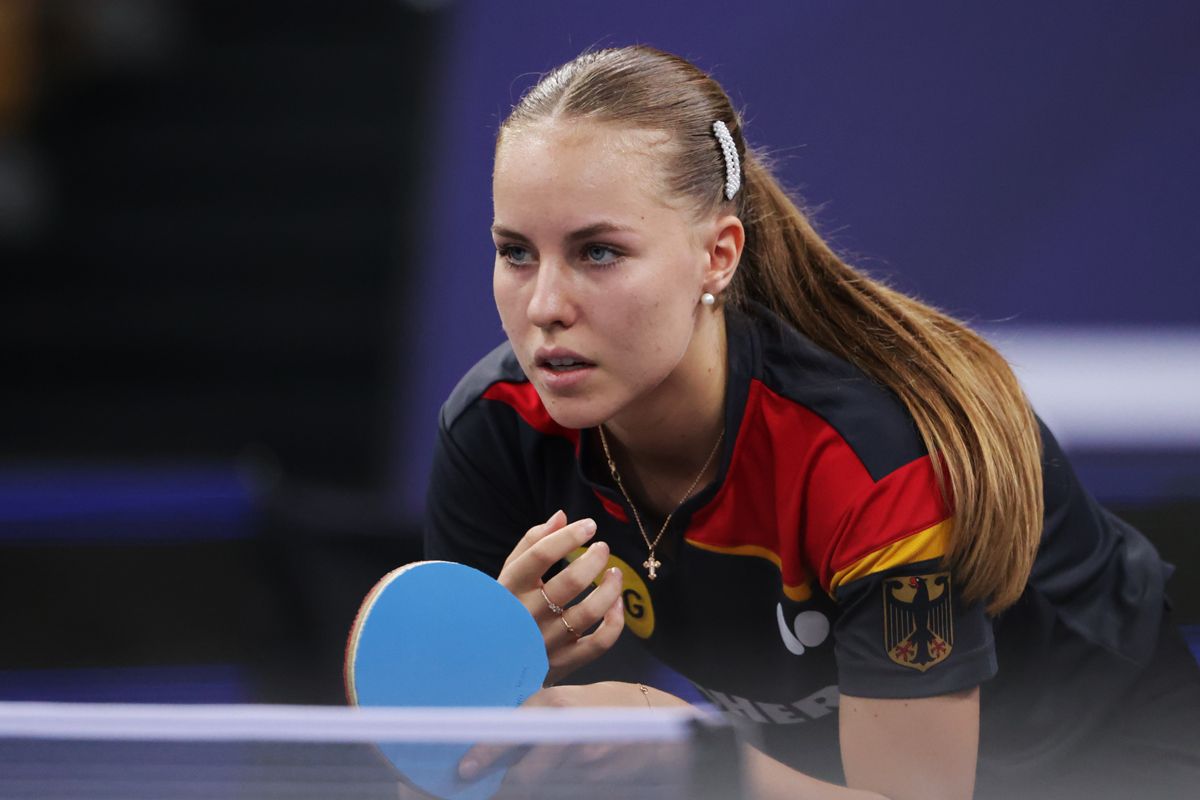
Table Tennis Report refrained from on-site coverage at the World Championships for the first time since its creation in 1957 (including the period after moving to the web publication in 2018). There were many reasons for the decision, but the absence on site left us great scars. In a similar manner there were many players who decided not to attend the event for several reasons. Among them, especially, the German Table Tennis Association made a radical decision to attend the event without the top three players, it made us want to ask the real truth behind such a decision.
I hope the World Team Championships held once every two years will remain the most prestigious event to decide the strongest team in the world. We watched some nail-biting fierce battles in Chengdu, some of which were fiercer than in the past. Therefore, we do not think the authority of the event was damaged even though some of the top players had cancelled their attendance. However, that does not sweep away the non-attendance of the players who should have been there. Such regulations should be reviewed if the lack of the points awarded to the singles ranking for the wins in the team event contributed to the decision of not attending the championships as Ms. Herweg mentioned.
Luckily, we can confirm the fact that Ms. Herweg, eventually the German Table Tennis Association, has the same thoughts.
The decision is up to the players eventually, but we sincerely hope the World Team Championships will remain the best stage for the players where they are honoured to perform.
(Article by Takahiro Sato)
